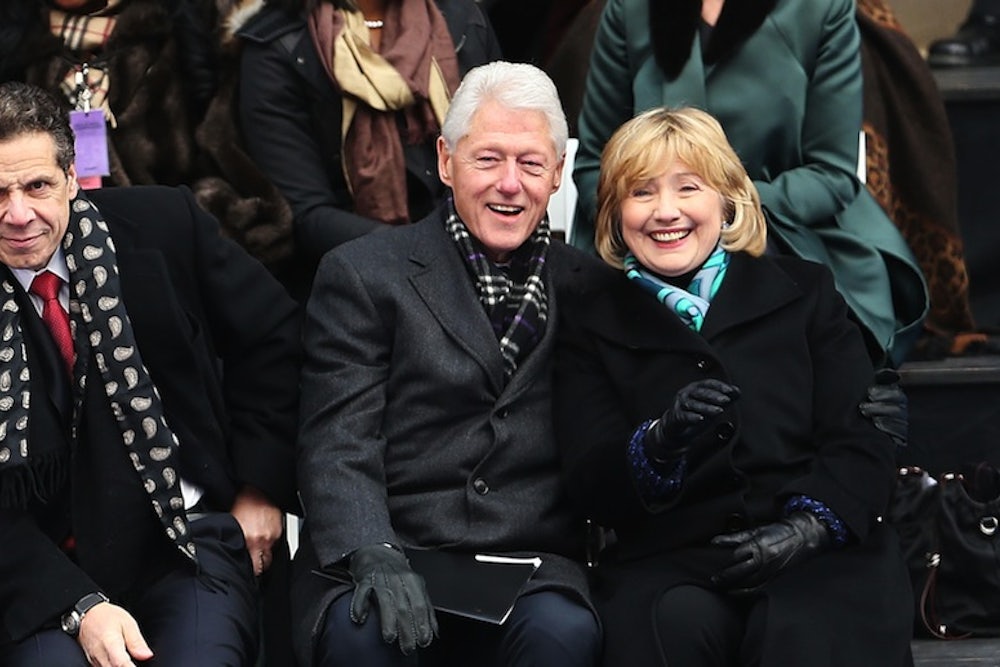Try the following thought experiment: Chris Christie, or Sarah Palin, or Andrew Cuomo is asked by a friend about sexual harassment allegations against a powerful Senator. Christie, or Palin, or Cuomo responds that he or she is tired of all these whiny women. Now imagine the friend's records are released. What would be the reaction in the media and among feminist organizations? It is inconceivable that there would not be an uproar, a forced apology, and some articles about how this will hurt the prospective candidate with women, and endanger his or her presidential hopes.
Well, this actually happened on Monday, but not in relation to Christie or Palin or Cuomo. Instead, a trove of Diane Blair's records were released, and they contained accounts of conversations with her onetime dear friend Hillary Clinton. (Blair, a former political science professor who died in 2000, knew both Clintons from Arkansas.) In these records, Blair recorded the following, about the infamous Senator Bob Packwood, who was eventually forced to resign for gross misconduct, which included harassing and abusing numerous women:
In 1993, Hillary Clinton derided a group of women who made claims of sexual harassment against Republican senator Bob Packwood, according to Blair. “HC tired of all those whiney women, and she needs him on health care,” wrote Blair of her conversation with Hillary Clinton, who was heading up her husband’s ulitmately unsuccessful effort to reshape the U.S. health care system.
Charming stuff. And yet as far I can tell, this revelation has been met with...silence. Amy Chozick's piece in The New York Times on the release of Blair's papers doesn't even mention the Packwood comment. Instead we get a tired recitation of the Lewinsky mess, with a Gennifer Flowers cameo included. (Chozick: "A Feb. 16, 1992, memo marked 'privileged and confidential' highlights 'possible investigation leads,' including a strategy to stop reports about Mr. Clinton’s alleged affair with Gennifer Flowers. The memo expressed the need to expose Ms. Flowers, who claimed to have had a 12-year relationship with Mr. Clinton, as a 'fraud, liar and possible criminal to stop this story and related stories.'")
The Lewinsky material, however, does contain glimpses of Hillary Clinton at her less-than-best.
Mrs. Clinton called Ms. Lewinsky a “narcissistic loony toon,” according to a 1998 conversation Ms. Blair recalled. “HRC insists, no matter what people say, it was gross inappropriate behavior but it was consensual (was not a power relationship) and was not sex within real meaning” of the word, Ms. Blair wrote.
I do not know why Clinton is so certain this was not a "power relationship." But at least in this case Clinton held undoubtedly raw feelings; to express them, especially to a friend, is understandable.
The other interesting release in the documents is this astute comment from Clinton:
“I know I should do more to suck up to the press. I know it confuses people when I change my hairdos, I know I should pretend not to have any opinions, but I’m just not going to,” she continued. Then, Mrs. Clinton said, “I’m used to winning and I intend to win on my own terms.”
Twenty years later, it's hard to remember how shocking it was for a First Lady to express herself so forthrightly, and to so intently set out to ignore gender barriers. It's this admirable attitude, I think, that largely explains the support Clinton has always received from feminists and women's groups. If she runs in two years, she will still have it.
But this is the same Clinton who long remained silent and defensive about allegations against her husband (which went well beyond the Lewinsky affair), and evinced such surliness about the (verified) claims against Packwood. As a reminder, here is a quote from Melinda Henneberger's great piece on the Clintons from 2008:
During their Arkansas years, one of her ways of sidestepping bad news of all kinds was simply refusing to read the papers. After the Gennifer Flowers story came out during her husband's '92 presidential run, her response, according to Carl Bernstein, was to throw herself into efforts to discredit Flowers and to try to persuade horrified campaign aides to bring out rumors that Poppy Bush had not always been faithful to Barbara.
And here are Henneberger and Dahlia Lithwick in another great piece on the Clintons:
She has been on the wrong side of gender bias. OK, there is no right side, but she consistently relates to and protects and stands with the oppressors in the gender wars, not the victims. It isn't only that she stayed with Bill Clinton, but that she invariably sees him as the victim, preyed upon by a series of female aggressors. According to Carl Bernstein's A Woman in Charge, as her husband prepared to run for president, she pushed to get sworn statements from women he'd been rumored to have been involved with, statements in which they were supposed to say they'd had no relationship with him. She even interviewed one of these women herself, at her law firm. She also led efforts to undermine Gennifer Flowers, whom she referred to as "trailer trash."
The point isn't that one should have no sympathy for Hillary Clinton, or that she did not put an important focus on gender issues when running the State Department. People, as a colleague reminds me, are complex. But those who care about women's issues should ask the same questions of Hillary Clinton that they would of anyone running for president.
Given that Rand Paul has started attacking Hillary Clinton for Bill's transgressions, once again turning the scandals into a partisan issue, that is unlikely to happen. (By the way, Paul is truly nuts if he thinks this is a smart political strategy. Does he remember what happens to Clinton's poll numbers when she is attacked?) And besides, there is nothing the press hates more than something that can be deemed old news.
